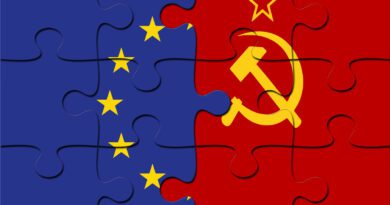How to sell your virtue for your own dollar – EU loans for Poland unlocked for Siemens’ sake

The European Commission has decided to unlock Poland’s National Reconstruction Plan funds. While this is a triumph for the new government’s camp, for the previous one it proves how deceitful and malevolent was the game that Brussels and Berlin played against it. It is just another example of how a Pole is not wise after the fact, as the saying has it, but is foolish both before and after. The billions from Brussels will not even be spent on Poland’s further development, but on saving Germany’s Siemens.
Rafał A. Ziemkiewicz
Few remember a letter written almost two years ago by one of the German business organizations, proposing the fastest possible inception of Poland’s National Reconstruction Plan. It was in no way an expression of support for the policy of Law and Justice (PiS): its authors were not concerned about that issue, but merely noted that most of the money from the plan would be used to make purchases from German firms, and so every month’s delay in launching it meant losses to the German economy.
This was not really anything new – the former EU finance commissioner Günther Oettinger had estimated publicly some years earlier that out of every euro from the EU budget spent in the “new member states,” about 80 cents came back to Germany (Poland’s commissioner Elżbieta Bieńkowska went further, judging that every euro spent here generated €1.20 in income for Germany). We should add that these estimates concerned the period before the “Next Generation EU” program, which entails a common debt incurred supposedly for the “rebuilding of European economies after the pandemic.” Now, that euro spent on the “new members” no longer comes from taxpayers in the “old Union,” but from credit that will be repaid at some point largely by the “beneficiaries” themselves, a fact that increases even further the profits reaped by the German economy.
NEITHER A FAVOR NOR CHARITY
However, this knowledge is not readily shared, and in Poland it is even denied – the aforementioned letter was not recorded anywhere except in our Do Rzeczy weekly. The fact that EU money is neither a favor nor charity does not fit the narrative presented in Poland, whether by Jarosław Kaczyński’s Law and Justice (PiS) or Donald Tusk’s Civic Platform (PO).
According to the former – again, few probably remember this – the National Reconstruction Plan was money won for Poland by Prime Minister Mateusz Morawiecki. When he took over from Beata Szydło, in order to improve relations between PiS and Europe, Morawiecki carried out a task set him by his party leader, agreeing to practically everything the EU demanded, and accepting at face value such verbal promises as “be gentlemen and agree to this clause on respect for the rule of law, and we won’t apply it except in controlling the expenditure of EU funds.”
In return, he gained the opportunity to triumphantly display billboards across Poland boasting of all the things the Poles would pay for with the 700 billion he had arranged (but without mentioning that the money was borrowed and we would have to pay off the debt).
All that mattered, of course, was the short-term political struggle – the billboards were supposed to undermine the left-liberal opposition’s narrative that the resistance put up by PiS against the EU powerhouses was losing us subsidies, and to persuade voters that the government camp was also capable of gaining billions from Brussels. In fact Morawiecki and the whole of PiS were then caught in a trap: by boasting of the 700 billion before obtaining a guarantee that they would actually receive it, they encouraged the EU to impose increasingly far-reaching conditions, which when fulfilled would be followed by others that went even further. The unlocking of the National Reconstruction Plan became a political fetish, and in its name PiS agreed to torpedo a presidential bill on justice reform and to fulfill dozens of more or less absurd requirements called “milestones.” (The prime minister himself was apparently not aware of some of these, since now when handing over power he has warned in parliament that if PO and its coalition partners form a government, they will allow the EU to tax Polish fuel-burning vehicles – while in fact he himself allowed this as part of the milestones.)
Sovereignty or money: Poland is being targeted by “federals”
The European Commission’s constant humiliation of PiS with further demands was clearly coordinated with the demagogic opposition propaganda about the “billions” lost by Poland due to the governing party’s senseless insistence on “violating the rule of law.” A constant feature of the propaganda put out by TVN and related media was the laments of local leaders that they would be building a school, a swimming pool, a road interchange, or something similar, if it were not for PiS blocking the funds from the National Reconstruction Plan. Donald Tusk appeared in ads against a background of computer-generated pallets full of euro notes, vowing that on the first day after winning the election he would “go to Brussels and unlock the funds for Poland,” without even noticing that he was thus confirming the PiS narrative that the Commission was not at all concerned with the rule of law or other changes to Polish legislation, but just wanted to see PiS lose the election and hand over power to Tusk.
Did the National Reconstruction Plan issue really play such an important role in the election as has been claimed? It would seem not. The decisive issues concerned identity and dignity, not the material sphere, where polls showed quite consistently that the great majority of Poles were satisfied with their status, and so as voters did not attach it so much weight as was the case in previous decades. Nevertheless, after his election success, Tusk felt obliged to set about “unlocking the funds” – he did indeed travel to Brussels for a meeting with Commission President von der Leyen, although he was given no better a reception than his predecessors. Just like them, after the meeting he had to go out to face the press alone, and as in the case of Morawiecki and Duda, his assurances that he had achieved an understanding and had been promised that the funds would be “unlocked” were in no way corroborated by the other side.
WHY THE RUSH?
In recent days, however, fortune has smiled on Tusk, at least superficially. An item was unexpectedly added to the Commission’s agenda at the last minute, concerning the transfer to Poland of a 5.1 billion euro advance payment toward the National Reconstruction Plan. Of course, this will not be pallets full of banknotes that Poland might spend on schools, swimming pools, roads or other freely chosen investments – such a depiction of these funds was a lie from the start. The money awarded can be spent for only one strictly defined purpose: “green energy transformation.” And specifically for buying wind turbines. It is no accident that one of the most strongly demanded “milestones” was a change to Polish law to make it easier to erect wind turbines by abolishing the legal requirement to maintain a zone around them that would protect the health of local residents.
From PiS, the Commission’s unexpected decision was met with the thunderous cry of “we told you so!” – all the louder given that it allowed them to wave aside all of the faults of the outgoing governing party in the matter of the reconstruction plan. Indeed, the “unlocking,” not being preceded by any changes whatever in the areas that were said to be the reason for the funds being blocked, seems to be strong evidence of the EU’s hypocrisy and a confirmation that what mattered throughout the dispute was not any kind of rule of law, but the installation in Warsaw – like in Rome and Athens previously – of a government that would be obedient to the Eurocrats. The only question is whether anyone ever really doubted that, and needed such evidence. We may ask, however, why Brussels showed its hand by rushing through a decision that could easily have been left until the new government was constituted in Warsaw and had created any pretext at all concerning the “protection of the rule of law.” If the German economy had waited so many months, surely it could have survived one more?
Well, it turns out that it can wait no longer. An explanation for the European Commission’s decision can be found in the business press, which in recent weeks has been writing about the unexpected deep crisis affecting Siemens, one of the chief pillars of the now teetering German economy. The Financial Times, followed by other media (in Poland the matter was described in detail by Money.pl), reported that Siemens was on the edge of bankruptcy due to the collapse of its subsidiary Siemens Energy, which makes wind turbines. This was supposed to be the engine of the new “green” economy. It turned out, however, that the green technology had got too much for the Germans – a huge number of breakdowns, complaints and contractual penalties undermined Siemens’ position, which was then demolished by the decision of many countries (Denmark in particular) to cancel plans to build huge wind farms. In this situation, the group could be rescued only by some new large contract, coming before the end of the year. For a sum, according to the Financial Times, of at least 4.5 billion euro. This is exactly the amount which, according to unofficial reports, Poland is to spend on new wind turbines out of the unlocked National Reconstruction Plan funds.
To sum up: Through the joint effort of the two hostile political tribes, Poland has sold its sovereignty for the right to buy German “green” junk that it has no need for, for borrowed money that it will itself pay back in the future. And much of the country is happy to have received this present from Europe. Rockefeller’s legendary transaction in which he bought a bank for money borrowed from the same bank is nothing compared with this display of German cunning and Polish stupidity.
This article was first published in Polish in the Do Rzeczy weekly in November 2023.



